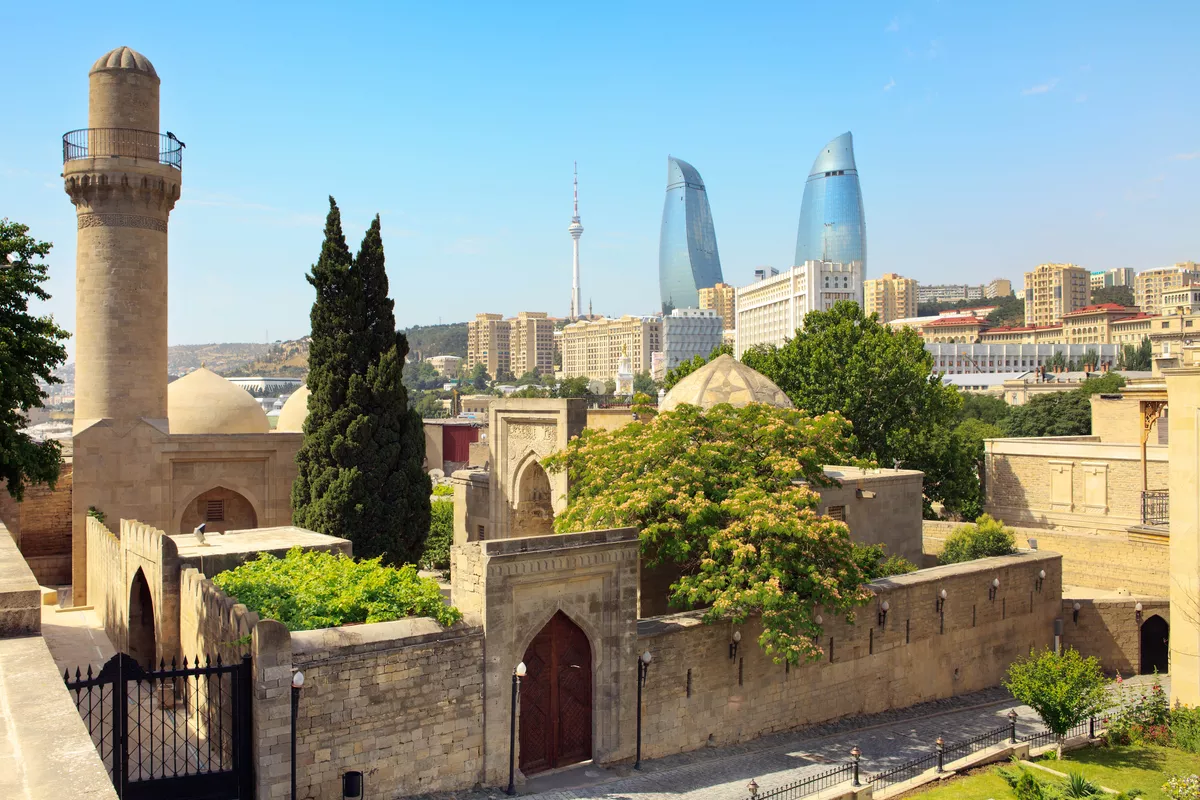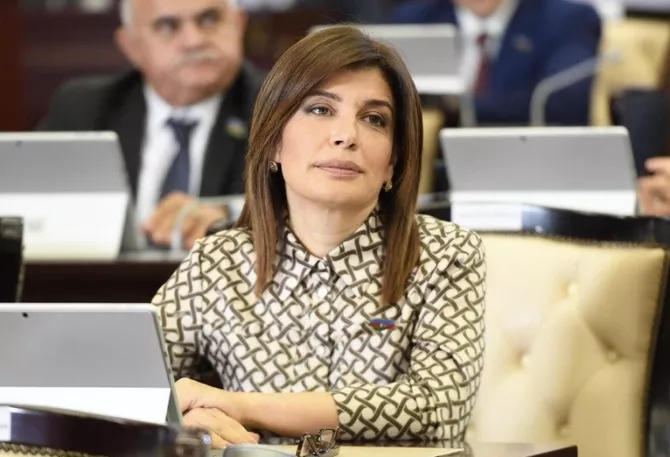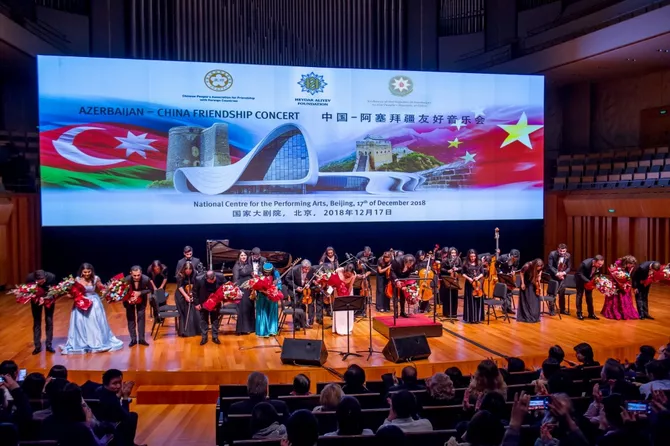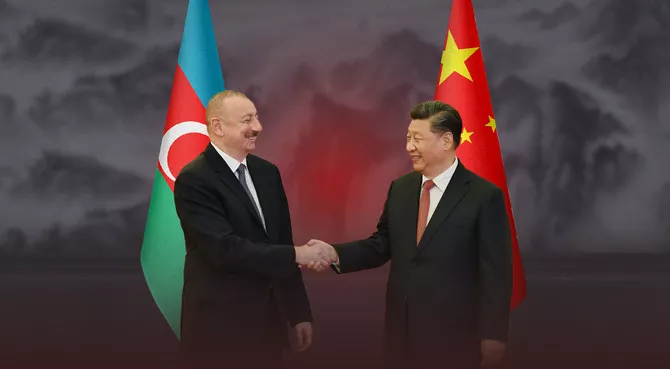
Credit: Getty Images
In today’s world, diplomacy increasingly speaks the language of culture; logistics becomes an extension of civilizational dialogue; and a visa agreement serves as a symbol of geopolitical trust. Positioned at the crossroads of epochs and empires, Azerbaijan is once again playing a pivotal role in shaping Eurasia’s architecture.
The Caspian Post speaks with Gunay Afandiyeva, Member of the Milli Majlis and Deputy Chair of the Culture Committee. At the center of our conversation is the newly signed visa-free travel agreement with the People’s Republic of China-but the discussion extends far beyond protocol, touching on a future where Azerbaijan emerges as both participant and architect of a new world order.

- The ratification of the agreement between the Government of the Republic of Azerbaijan and the Government of the People’s Republic of China on mutual visa exemption for holders of ordinary passports has drawn widespread attention. However, many view it primarily as a technical measure to facilitate travel. From your perspective, what is the true meaning and strategic significance of this agreement?
- This agreement, which establishes a new architecture of trust between Azerbaijan and the People’s Republic of China, should not be regarded as a mere simplification of the visa regime. Rather, it stands as a symbol of deep geopolitical recognition. It is not only a pragmatic step that promotes tourism and business ties, but also a milestone in building a new model of cooperation across Greater Eurasia. Its signing and ratification serve as compelling evidence that Beijing sees Azerbaijan as a reliable, predictable, and respected partner. In a global environment marked by fragmentation and systemic realignment, such recognition is particularly valuable.
We are talking about 21st century diplomacy, where "soft power"-through science, education, culture, tourism, and logistics-becomes the primary driver of resilience and influence. This agreement fits seamlessly into the far-sighted and balanced foreign policy line consistently pursued by President Ilham Aliyev. Grounded in the principles of sovereign choice and strategic pragmatism, it strengthens Azerbaijan’s international standing and transforms us from mere participants to co-authors of Eurasia’s future. We are building an axis of trust along which not only transport and investments move, but also mutual respect, civilizational dialogue, and a shared continental destiny.
In this light, the agreement with China is a diplomatic beacon, signaling that Azerbaijan is not a bystander but an architect of an open, mutually beneficial, and multi-layered Eurasia.
- You often refer to historical context. Could you explain how the historical interaction between our countries influences the present and what aspects of the past are, in your view, being revived in this new reality?
- Let me begin by saying that history is not merely a record but a living system of guidance. When we speak of the Great Silk Road, we are not reminiscing-we are continuing its path through modern forms of cooperation.
For millennia, across deserts and empires, the Silk Road served not just as a trade route but as a cultural matrix where the destinies of nations intertwined, forging unique civilizational alloys. Within this vast historical framework, Azerbaijan-located at the heart of the route-emerged as a natural bridge between East and West, a crossroads of energies, ideas, craftsmanship, and spirit.
Among Azerbaijan’s oldest and most profound ties are those with China. These relations extended far beyond diplomatic scrolls and silk caravans. They found vivid expression in aesthetics, artistic sensibilities, and the deeply philosophical creativity born at the intersection of cultures.
As early as the 12th century, the immortal Nizami Ganjavi-poet, humanist, and philosopher-immortalized a Chinese princess in his poem Seven Beauties, giving her voice to a parable on good and evil. This stands as testimony to the poet’s awareness of Chinese wisdom, aesthetics, and cultural significance.
In the 13th-14th centuries, during the cultural flourishing of Maragha, Tabriz, and other Azerbaijani cities, miniature artists, calligraphers, and painters boldly merged the delicate techniques of the East with the rich traditions of Azerbaijani art. This synthesis became a symbol of refined civilizational dialogue-where brush and pen were the diplomats of art.
Even in the turbulent 18th century, as the world was undergoing rapid change, the renowned Azerbaijani poet and statesman Molla Panah Vagif praised China in his lyrical works as a land of refined beauty, elegance, and harmony-a benchmark among global cultural powers.
This legacy of spiritual resonance is preserved in our historical memory. Today’s Azerbaijan, carrying this legacy forward, once again becomes a platform for strategic and cultural interaction between the Caucasus and the Far East. The Azerbaijan-China connection is a mandate of history, pointing the way toward a new humanistic synthesis.
This proves that cultural exchange knows no boundaries of time-it embeds itself in the DNA of nations, forming a cultural memory that can transform but never vanish. Today, these historical layers come alive once more: through joint exhibitions, academic expeditions, student forums, and mobility programs. We are, in essence, continuing an ancient manuscript-each new page revealing a modern reality, but written in the same hand: openness, respect, mutual enrichment.
Historical engagement builds trust, and trust lays the foundation for strategic partnership. This is particularly vital in an age of global challenges, where sustainability depends not only on economics but also on the depth of cultural ties. In this sense, history is no longer about the past-it is about the future we are building, rooted in a shared and conscious memory.
- What new horizons does this agreement open in the humanitarian and cultural spheres? Can we expect institutional renewal in these areas?
- Absolutely. The Heydar Aliyev Foundation already demonstrates an impressive cultural presence in China-from exhibitions to the support of educational and humanitarian projects. But this agreement opens even broader horizons. It establishes a robust, multi-layered framework for collaboration across universities, theaters, museums, and research centers.

The Azerbaijan-China friendship concert co-organized by the Heydar Aliyev Foundation and the Chinese People’s Association for Friendship with Foreign Countries
This document becomes a kind of highway for cultural exchange-accelerated, flexible, and forward-looking. It doesn’t just set rules; it inspires the creation of creative alliances-between artists and curators, musicians and composers, archaeologists and digital reconstruction experts.
Literary scholars can delve into dialogue between ancient poetic schools, while art historians may uncover parallels between Silk Road traditions and the cultural fabric of the South Caucasus. It paves the way for regular artistic residencies, joint archaeological expeditions, academic exchanges, and even co-authored scientific and artistic works that embody a new phase of intercultural synergy.
In this context, the humanitarian sphere becomes a true engine of integration. It accumulates emotional trust, initiates horizontal ties, and generates the soft yet powerful energy without which strategic alliances cannot thrive. Cultural diplomacy thus rises to a new qualitative level, becoming a space of creation where ideas are born, the future is imagined, and mutual respect between nations is deepened.
- In your view, how closely is Azerbaijan’s economic strategy connected to this cultural-civilizational dialogue? Is there synergy at these levels?
- Azerbaijan is a land of meaning and connectivity. Our country’s geostrategic location, its active participation in the “One Belt, One Road” initiative, and its role in shaping transport corridors position us at the heart of the global logistics architecture. But more importantly, every corridor, cargo ship, and business mission is, at its core, an expression of trust, understanding, and cultural affinity.
Here, economy and culture merge into a single entity, where infrastructure development becomes a continuation of civilizational dialogue. Azerbaijan offers a unique format of integration: business gains meaning, and culture finds stable platforms for development. The humanitarian dimension of foreign policy amplifies the impact of economic agreements, making them deeper and more enduring. Through trade, we build trust. Through investment, we lay the foundation for a shared future in which material and spiritual values reinforce one another.
In short, economic projects expand the reach of humanitarian influence. This is the essence of Azerbaijan’s formula for resilience: connecting routes with ideas, interests with identity, movement with dialogue.
- What message is Azerbaijan sending to the world by signing such agreements and deepening cooperation with global powers like China?
- It is a message of maturity. By signing agreements with China and strengthening ties with leading world powers, Azerbaijan asserts its role as a full-fledged architect of the international system. We no longer view global processes as external phenomena-we participate in their formation. Our foreign policy is not a reaction but a strategy.

Photo credit: trendsresearch.org
We build partnerships based on sovereignty, where respect for identity is coupled with technological progress, and mutually beneficial cooperation is offered as an alternative to geopolitical coercion. China, Central Asia, Europe, Türkiye-these are not divergent vectors, but elements of a unified system that Azerbaijan helps to shape within a new geoeconomic context. We act as a bridge and a leader in the Turkic world-a growing geopolitical actor across a broad region-as well as an intellectual and transportation hub, a point of convergence for the interests of East and West, North and South.
In an era where unilateral models are losing relevance, Azerbaijan is advancing the concept of equitable multilateral engagement. This is 21st century diplomacy-flexible, resilient, and grounded in balance, cultural sensitivity, and responsibility to future generations. And in that future, Azerbaijan speaks not as a footnote, but as a confident, respected, and constructive voice.
Share on social media